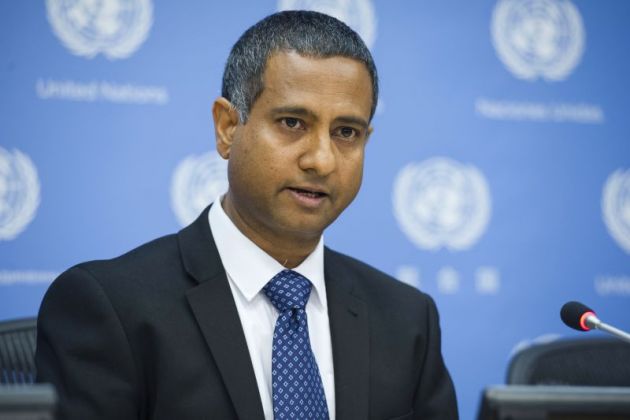World's nations urged to protect 'mutually reinforcing' freedoms of expression, and religion or belief by UN expert

GENEVA – The world's nations must step up measures to protect freedom of religion or belief, a UN human rights expert says, citing concerns about the increasing use of anti-blasphemy laws and the imposition of draconian criminal penalties for expressing an opinion about religion.
Ahmed Shaheed, the UN Special Rapporteur on freedom of religion or belief, spoke at the Human Rights Council here on March 5, citing concerns about the increasing use of anti-blasphemy laws and the imposition of draconian criminal penalties for expressing an opinion about religion.
"The increasing application of limits on freedom of expression, including new legal and extra-legal limitations by State and non-State actors, is having a concerning impact on freedom of religion or belief, globally," he said.
"Freedom of religion or belief and freedom of expression are closely interrelated and mutually reinforcing rights when exercised within the legal framework established by international human rights law.
"Consequently, where we observe abuses of one right, we are likely to see the stage being set for abuses of the other," he said.
In his report to the UN Human Rights Council, Shaheed presented examples of restrictions on freedom of expression, including public order measures, anti-blasphemy, anti-proselytizing and anti-apostasy laws, as well as policies to combat religious hatred and extremism.
ASIA BIBI
Among some of the cases he singled out:
- Asia Bibi, a Pakistani Christian woman sentenced to death for blasphemy in 2010.
Bibi was reportedly accused of defiling the cup meant for her Muslim colleagues after drinking water from the vessel, on the grounds that as a Christian she was 'unclean' and forbidden to use the same utensils as Muslims.
- Ashraf Fayadh, Palestinian poet and artist, who was sentenced to death in the Kingdom of Saudi Arabia for apostasy in 2015, after which an appeals court commuted the sentence to eight years in prison and 800 lashes.
He was accused of apostasy because he allegedly questioned religion and promoted atheism through his poetry. Mr. Fayadh remains a prisoner of conscience, detained for the mere peaceful expression of his opinion.
- "Pussy Riot", the Russian feminist punk rock protest group which briefly performed (and filmed itself performing) a song deemed critical of the authorities on 21 February 2012 in the restricted part where the altar is located in Moscow's largest Russian Orthodox Church.
Members of the band were arrested and criminally charged with hooliganism.
- Adoption of an amendment to Nepal's penal code in 2017, which criminalizes 'hurting of religious sentiment" and religious conversion.
Shaheed said that nearly 70 States have anti-blasphemy laws, with 30 States also carrying anti-apostasy laws.
In some jurisdictions, either or both of these laws may provide for the use of the death penalty.
"There has been a revival of anti-blasphemy and anti-apostasy laws, a proliferation of, and increasing reliance on, public order laws to limit expression deemed to be offensive to religious or belief communities," he said.
This has come along with increasing investments in strategies that combat expression which incites persons to discrimination, hostility or violence against persons on the basis of religion or belief.
The Special Rapporteur said that at the same time, he welcomed that some countries have recently repealed their former anti-blasphemy laws.
Shaheed urged nations developing strategies to tackle the issues to be guided by international initiatives like the Rabat Plan of Action, which seek to operationalize States' obligations to respond to any promotion of religious hatred.
He also stressed that the Beirut Declaration on "Faith for Rights" was a source of important guidance and inspiration for action.